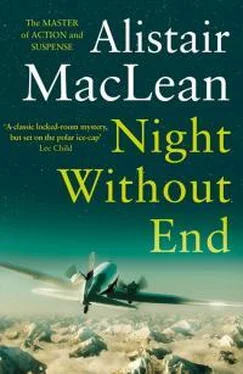Алистер Маклин - Night Without End
Здесь есть возможность читать онлайн «Алистер Маклин - Night Without End» — ознакомительный отрывок электронной книги совершенно бесплатно, а после прочтения отрывка купить полную версию. В некоторых случаях можно слушать аудио, скачать через торрент в формате fb2 и присутствует краткое содержание. Год выпуска: 101, Жанр: Боевик, Триллер, на английском языке. Описание произведения, (предисловие) а так же отзывы посетителей доступны на портале библиотеки ЛибКат.
- Название:Night Without End
- Автор:
- Жанр:
- Год:101
- ISBN:нет данных
- Рейтинг книги:4 / 5. Голосов: 1
-
Избранное:Добавить в избранное
- Отзывы:
-
Ваша оценка:
- 80
- 1
- 2
- 3
- 4
- 5
Night Without End: краткое содержание, описание и аннотация
Предлагаем к чтению аннотацию, описание, краткое содержание или предисловие (зависит от того, что написал сам автор книги «Night Without End»). Если вы не нашли необходимую информацию о книге — напишите в комментариях, мы постараемся отыскать её.
An airliner crashes in the polar ice-cap. In temperatures 40 degrees below zero, six men and four women survive. But for the members of a remote scientific research station who rescue them, there are some sinister questions to answer – the first one being, who shot the pilot before the crash?
Night Without End — читать онлайн ознакомительный отрывок
Ниже представлен текст книги, разбитый по страницам. Система сохранения места последней прочитанной страницы, позволяет с удобством читать онлайн бесплатно книгу «Night Without End», без необходимости каждый раз заново искать на чём Вы остановились. Поставьте закладку, и сможете в любой момент перейти на страницу, на которой закончили чтение.
Интервал:
Закладка:
I wondered how far away Hillcrest and the Sno-Cat were. I was as certain as I could be of anything that he would have headed due west as soon as he would have emerged from the Vindeby Nunataks, and he’d had time and to spare to make the coast by this time – not even the blizzard of last night could have stopped the Sno-Cat, the engine was a completely enclosed unit, its great caterpillars would take it over the loosest, the most newly fallen snow. But even had he backed his hunches and headed for the coast, as I hoped, he might still be anything up to twenty miles to the north or south of us, or he might be not only north or south but fifteen miles ahead of us – we had no maps left but I was fairly certain we were about that distance from the coast. Or was it possible that Hillcrest, a shrewd and thoughtful man, might have thought the gambit of a break for the coast too obvious a move? Could it not be that he might have indeed pressed on for Uplavnik, or even turned due north after he had come through the hills? Or, if he were coming west, would he not perhaps be driving in a search pattern, quartering the ground between the Vindeby Nunataks and the coast in a series of wide advancing zigzags? If that were so, he might still be anything up to thirty miles behind. It was infuriating beyond measure to know that he was almost certainly within two or three hours’ driving time from where we were, but without a wireless or any other means of contacting him he might as well have been a thousand miles away for any hope there was of two tiny moving objects encountering each other by chance in that vast and featureless land.
Soon after eight o’clock in the morning I stopped to have a look at the two sick people on the sledge, professional instinct, I suppose, but an empty token gesture: there was nothing we could do for them, except give massage at frequent intervals. The sound of Mahler’s dyspnoea, his whooping gasping breathing, was the tolling of a death-bell to our ears, and this effort to breathe was extinguishing the last embers of life in his emaciated and frozen body. In three hours’ time, by noon at the latest, Mahler would be dead. Nothing could ever save him now, it was madness, an utterly wasted effort to continue to drag him along on a sledge: he was past caring or knowing or feeling now, he could die just as peacefully if we left him lying on the glacier. Or so I have thought since then. But Mahler was more than a man to us that day, he was a symbol: we would leave Mahler when he had drawn his last gasping breath, but never before.
Marie LeGarde was dying too, but quietly, softly, peacefully, like a little candle flame flickering to extinction. Maybe she would go first, maybe Mahler. But both of them would die this day.
The going was becoming increasingly difficult now, not so much because of the gradually steepening slope of the glacier which made the sledge overrun us more and more frequently, but because of the fact that Jackstraw’s torch had all but completely given out, and the fissures and crevasses that, earlier, had merely been nuisances to be negotiated, now became menaces to be avoided at the cost of our lives. It was now that Balto proved of his greatest value yet: as Jackstraw had said on our first day out from the IGY cabin, the big Siberian had an uncanny nose for crevasses, both open and hidden, in daytime or dark, and he made never a mistake that morning, constantly running ahead and then back towards us to guide us in the safest direction. Even so, progress was heartbreakingly slow.
Shortly after half-past eight in the morning we came across the tractor sled lying at an angle against a moraine. Even in the near darkness it was plain to see what had happened. The steepness of the glacier, not to mention sudden unaccountable dips to left and right across its width, must have made the heavy sled a dangerous liability, for, from its tracks, we had several times seen where it had slewed wildly at an angle, pivoting round on its iron tow-bar as, brakeless, it had sought to overrun the tractor. Obviously, Smallwood and Corazzini must have feared – and with reason – that on one of these occasions it would pull round the tail of the tractor after it and topple the tractor on its side, or, worse, drag it into a crevasse: so they had unhooked the tow-bar and left the sled.
It was surprising that they hadn’t done this earlier: apart from carrying their fuel and food, which reserves could easily have gone into the tractor cabin itself, it had been a useless encumbrance to them. As far as I could judge they had abandoned it with all its contents – apart, of course, from the portable radio – including the wraps we had given Zagero and Levin when they had ridden on it at the point of a gun. We took these, tucked them round Mahler and Marie LeGarde and passed on.
Three hundred yards later I stopped so abruptly that the sledge, bumping into me, made me lose my footing on the slippery ice. I stood up, laughing softly, laughing for the first time for days, and Zagero came up close and peered into my face.
‘What gives, Doc?’
I laughed again and was just on the point of speaking when his hand struck me sharply across the face.
‘Cut it out, Doc’ His voice was harsh. ‘That ain’t goin’ to help us any’
‘On the contrary, it’s going to help us a very great deal.’ I rubbed a hand across my cheek, I couldn’t blame him for what he had done. ‘My God, and I almost missed it!’
‘Missed what?’ He still wasn’t sure that I wasn’t hysterical.
‘Come on back to the tractor sled and see. Smallwood claims he thinks of everything, but he’s missed out at last. He’s made his first big mistake, but oh, brother, what a mistake! And the weather’s just perfect for it!’ I turned on my heel and actually ran up the glacier towards the sled.
Many items were carried as standard equipment in IGY parties, both in the field and at base camps, and none more standard than the magnesium flares which first came into common use in the Antarctic over a quarter of a century ago – they are indispensable as location beacons in the long polar nights – and radio-sondes. We carried more radio-sondes than any other item of equipment, for our primary purpose on the ice-cap – the garnering of information about density pressure, temperature, humidity and wind direction of the upper atmosphere – was impossible without them. These sondes, still crated with the tents, ropes, axes and shovels which we had found no occasion to use on this trip, were radio-carrying balloons which wirelessed back information from heights of between 100,000 and 150,000 feet. We also carried rockoons, radio rockets fired from balloons which took them clear of the denser parts of the atmosphere before releasing them. But right then rockoons were useless to me. So, too, were balloons at their normal operating height: 5000 feet should serve our purpose admirably.
The dim glow from the torch was more than sufficient, Jackstraw and I had worked with these things a hundred times. To couple the balloon to the hydrogen cylinder, disconnect the radio and substitute a group of three magnesium flares fused with RDX took only minutes. We lit the fuse, cut the holding cord and had a second balloon coupled on to the cylinder before the first was 500 feet up. Then, just as we had the third on the cylinder and were disconnecting its radio, the first flare, now at about a height of 4000 feet, burst into scintillating brilliant life.
It was all I could have wished for, indeed it was more than I’d ever hoped for, and Zagero’s heavy thump on my back showed how joyfully he shared my feelings.
‘Dr Mason,’ he said solemnly, ‘I take it all back, all I ever said about you. This, Dr Mason, is genius.’
‘It’s not bad,’ I admitted, and indeed if anyone, in those perfect conditions of visibility, couldn’t see the coruscating dazzlement of those flares at any distance up to thirty miles, he would have to be blind. If they were looking in the right direction, that was, but I was sure that with Hillcrest carrying five men and everybody almost certainly on the lookout for us, the chances of missing it were remote.
Читать дальшеИнтервал:
Закладка:
Похожие книги на «Night Without End»
Представляем Вашему вниманию похожие книги на «Night Without End» списком для выбора. Мы отобрали схожую по названию и смыслу литературу в надежде предоставить читателям больше вариантов отыскать новые, интересные, ещё непрочитанные произведения.
Обсуждение, отзывы о книге «Night Without End» и просто собственные мнения читателей. Оставьте ваши комментарии, напишите, что Вы думаете о произведении, его смысле или главных героях. Укажите что конкретно понравилось, а что нет, и почему Вы так считаете.










